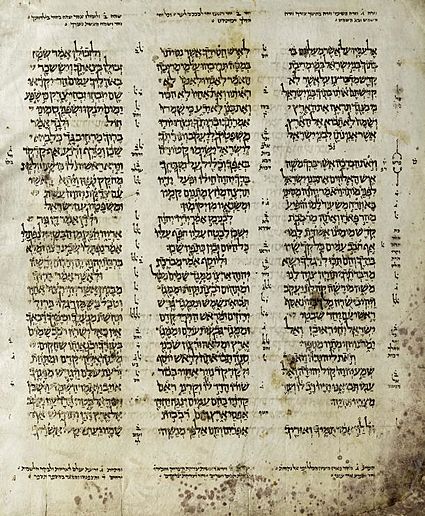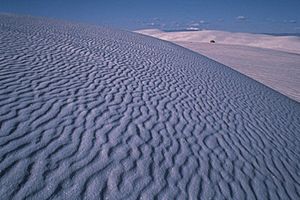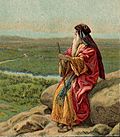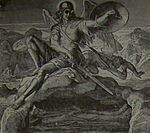V'Zot HaBerachah facts for kids
V'Zot HaBerachah (pronounced Vuh-ZOTE Hah-Buh-RAH-khah) is a special part of the Torah, which is the most important text in Judaism. Its name means "and this is the blessing" in Hebrew. This section is the 54th and final weekly Torah portion (called a parashah) that Jewish people read each year. It's also the 11th and last part of the Book of Deuteronomy.
This parashah includes chapters 33:1 to 34:12 from the Book of Deuteronomy. It tells the story of Moses giving his final blessings to the 12 Tribes of Israel before he dies. It also describes Moses's death.
V'Zot HaBerachah is the shortest parashah in terms of letters and words. It has 1,969 Hebrew letters, 512 Hebrew words, and 41 verses. Jewish people usually read this parashah in September or October during the Simchat Torah festival. Right after finishing V'Zot HaBerachah, they immediately start reading the very beginning of the Torah again. This shows that the Torah is a never-ending story. They read Genesis 1:1–2:3, which is the start of the first parashah called Bereshit.
Contents
Reading the Torah Portion
In traditional Jewish practice, the parashah is divided into seven parts. Each part is called an aliyah, which means "going up." This refers to the person "going up" to the Torah scroll to read or have the section read for them.
Moses' Farewell Blessing
In the first part, Moses, who was a special messenger of God, gives his final blessings to the Israelites before he passes away. He reminds them that God came from Sinai and showed great love for the people. God held them close and guided them. The people followed God's path and accepted the Torah as their special heritage. Moses prayed for the Tribe of Reuben to continue to thrive, even though they were a small group. He also asked God to help the Tribe of Judah and protect them from their enemies.
Blessings for Levites and Benjamin
In the second part, Moses prayed for the Levites. The Levites were a special tribe chosen to serve God and teach God's laws to Israel. Moses asked God to bless their work and help them succeed. He also prayed that God would protect them from their enemies. After this, Moses spoke about the Tribe of Benjamin. He said that God loved and always protected this tribe, keeping them safe and secure.
Blessings for Joseph's Tribe
The third part focuses on the Tribe of Joseph. Moses asked God to bless them with plenty of dew and sunshine for their crops. He prayed for abundant harvests and the riches of the hills. Moses compared Joseph's tribe to a strong bull with powerful horns, ready to overcome challenges across the earth. This blessing showed how strong and successful this tribe would be.
Blessings for Zebulun, Issachar, and Gad
In the fourth part, Moses encouraged the Tribe of Zebulun to be happy on their journeys and the Tribe of Issachar to be joyful in their tents. He said they would invite their relatives to a special mountain to offer successful sacrifices. They would also find great wealth from the sea and hidden treasures in the sand.
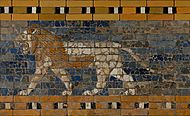
Moses then blessed the God who made the Tribe of Gad strong. He said Gad was like a lion, ready to act and choose the best for itself. This tribe would carry out God's plans for Israel.
Blessings for Dan, Naphtali, and Asher
The fifth part includes blessings for more tribes. Moses described the Tribe of Dan as a young lion leaping from Bashan. He told the Tribe of Naphtali that they were full of God's favor and blessings, and they would take over lands to the west and south.
Moses then prayed for the Tribe of Asher. He asked that they be the most favored among the tribes, have plenty of oil (a sign of prosperity), and have strong door bolts made of iron and copper for safety. He said they would have security every day. Moses also declared that there was no one like God, who rides through the heavens to help.
God's Protection for Israel
In the sixth part, Moses explained that God is an everlasting safe place and a strong support. God drove out their enemies, allowing Israel to live safely and without trouble. They would live in a land rich with grain and wine, blessed by the dew from heaven. Moses asked, "Who is like Israel?" He said they were a people saved by God, with God as their protecting Shield and a triumphant Sword over their enemies. This part ends with the end of chapter 33 of Deuteronomy.
Moses' Death
In the seventh and final part, Moses went up from the plains of Moab to Mount Nebo. From there, God showed him the entire land that God had promised to the descendants of Abraham, Isaac, and Jacob. Then, Moses, who was God's servant, died there in the land of Moab, just as God commanded. God buried him in a valley near Beth-peor, but no one knows exactly where his burial place is.
Moses was 120 years old when he died. Even at that age, his eyes were still clear, and he was still strong. The Israelites mourned for Moses for 30 days. After Moses, Joshua became the new leader. He was filled with wisdom because Moses had placed his hands on him, and the Israelites listened to Joshua.
The Torah concludes by saying that there was never another prophet in Israel like Moses. God spoke to Moses directly, face to face. God sent Moses to perform amazing signs and wonders against Pharaoh and Egypt, and Moses showed great power before all of Israel. This final reading finishes the parashah, the Book of Deuteronomy, and the entire Torah.


